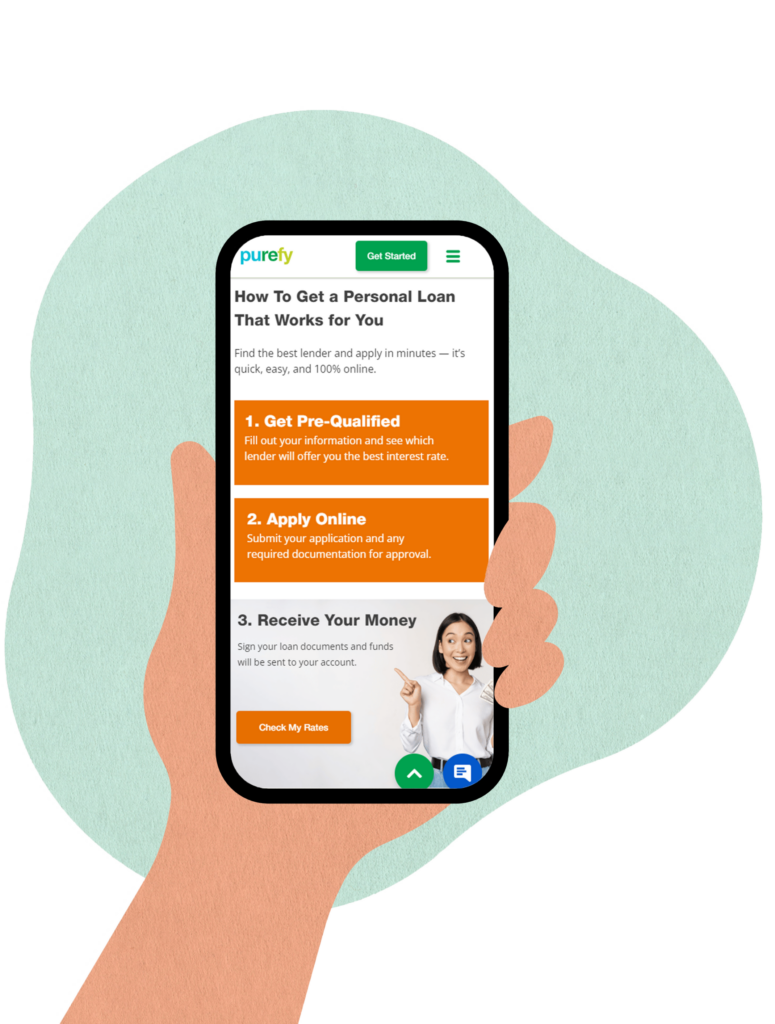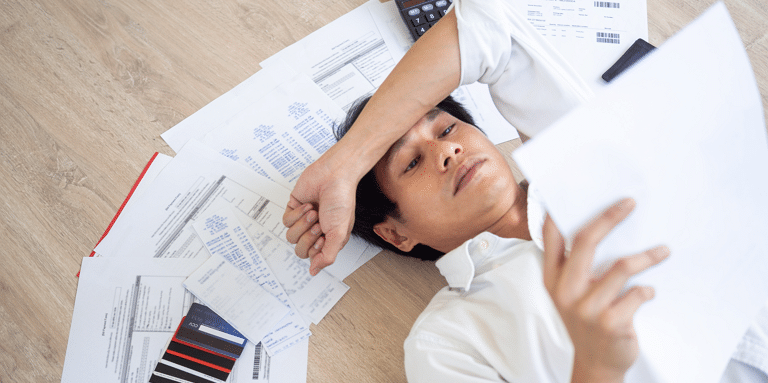It is startlingly common to overspend. According to a 2022 survey, approximately 60% of Americans said they lived paycheck to paycheck. Credit cards and personal loans can make it easy to get financing for purchases you can’t afford to buy with your savings or income alone, so more and more people are racking up debt.
However, overspending can cause significant issues. As you build debt, more interest accrues, and your balances can grow out of control. You may find you can’t afford the minimum payments, which can wreck your credit. And if your income dips due to layoffs or because you need to take medical leave, you may find that you can’t cover your bills or access lines of credit anymore.
Conquering the tendency to overspend is key to getting your finances on track. But it can be a real challenge, and it requires serious discipline to make it happen.
What does it mean to overspend?
When you overspend, you spend more money than you earn over a given period, or more money than you should be comfortable spending. You could overspend by dining out at restaurants or takeout, by purchasing more home than you can reasonably afford or by splurging on luxury items.
The causes of overspending can be complicated, ranging from not understanding how much money you have to overspending as a way to cope with stress. Some of the most common reasons people overspend include:
- Limited income: Overspending isn’t always due to poor financial management. Sometimes it happens because the cost of essentials is higher than your income. If you have a low-paying job or live in an area with a high cost of living, making ends meet can be difficult.
- Lifestyle creep: Lifestyle creep is when you start spending more as your income increases. When you get a raise, you may upgrade to a newer car, a larger apartment, or treat yourself to a new wardrobe. But lifestyle creep can cause you to outspend your earnings.
- Impulsive shopping: Whether you shop when you’re bored, depressed, or stressed, impulse purchases can quickly add up. Impulse buying can lead to overspending, regardless of your income level.
- Lack of planning: Sometimes, overspending is caused by a lack of planning. It’s inevitable that some expenses will pop up. Your car will need new tires, or your hot water heater will need to be replaced. If you don’t plan ahead and save for these expenses, they can strain your budget and cause you to rely on credit.
- Peer pressure: If you’re not careful, you can overspend because of peer pressure. This can happen when friends invite you out for drinks or to a concert and you don’t want to say no. You may also overspend if your peers are buying more expensive items than what your budget allows.
Outsmart Rising Credit Card Interest Rates With a Personal Loan
Credit card APRs often exceed 20%. Get your finances on the right track today with a quick & easy personal loan from our marketplace of top-rated lenders
11 Ways to curb overspending
Overspending can sabotage your financial goals and lead you into debt. If you have problems overspending, these 11 tips can help you regain control over your finances:
1. Sit down and create a budget
The first step in conquering your spending habit is to create a budget so you know exactly how much money you have to work with. Knowing what you have and tracking your expenses will help you understand how overspending affects your finances.
Look at your bank and credit card statements from the past three months, and total how much you spent on food, housing, entertainment, transportation, clothing, and other expenses. Then total how much income you have coming in each month and compare that figure to your expenses. This exercise will help you identify your weak points and where you need to make changes.
2. Set goals
Next, think about what you want to accomplish. Identifying your financial goals can help you stay focused and stick to your budget.
When establishing your goals, be specific and set a deadline for yourself. Visual reminders can also be powerful tools.
For example, overspending may cause you a significant amount of stress and sleepless nights. One of your goals may be to become debt-free within 12 months so that you can reduce that stress and get greater peace of mind.
Or perhaps you want to become a homeowner, and the tendency to overspend prevents you from saving enough money for a down payment. Stating that you want to buy a home within the next three years — and perhaps printing out a picture of your dream house to keep in your wallet — will help curb the temptation to spend money.
3. Use cash
If you regularly use a credit card to make purchases, try switching to using cash instead. Some people find that using tangible bills and coins helps them to be more mindful of their spending and make better decisions. And needing to stop at an ATM to take out more cash can be an extra hurdle to curb overspending.
4. Put your credit cards on ice (literally)
If your credit cards are simply too tempting, put them on ice. Fill up a bowl or glass with water, drop your credit card in there, and put it in the back of your freezer.
If you have an emergency and need your credit card, you can still access it — it will just take some time to thaw it out. But impulse purchases will be a lot harder to make if you have to wait for the ice to melt.
Looking for a less drastic approach? Store your credit cards in an inconvenient place, like on top of the fridge. Having to rummage around for your cards can give you the time you need to rethink your purchases.
5. Delete your payment information from your favorite sites
Online shopping makes it very easy to spend money on impulse purchases. Many retailers offer one-click purchases with your saved payment information that makes it even faster to buy things online.
If you find yourself shopping online too often, one of the best ways to stop overspending is to delete your payment information. This makes it more time-consuming to shop and can reduce impulse buys.
6. Start an emergency fund
Building an emergency fund can give you a cushion against unexpected expenses so you don’t have to use a credit card or loan. When you’re living paycheck to paycheck, an emergency fund can feel like an impossible task, but you can start small.
Trimming your expenses, selling things you don’t use, and canceling subscriptions can help free up cash for your emergency fund.
7. Plan your shopping trips
Before heading to the store, come up with a plan. If you’re shopping for groceries, make a list and stick to it; don’t make any additional purchases if they aren’t on the list. Planning ahead will also allow you to compare prices and take advantage of sales.
8. Automate savings
If you always seem to spend your entire paycheck, automating saving money can be a big help. Set up automatic transfers from your checking account to your savings account. The amounts don’t have to be huge; even $25 or $50 transferred every paycheck can make a difference over time.
9. Trim expenses
If you are spending more than you make, review your credit card and bank statements to see what your biggest expenses are, and look for areas to cut back or eliminate. This process can be hard, especially if you already live frugally. But common areas you may be able to reduce spending include:
- Housing: If your rent or mortgage payment takes up a significant portion of your income, downsizing to a smaller home may be a good idea. If that’s not possible, getting a roommate can help slash your housing expenses.
- Transportation: You may find that your car payment is too much for your budget. If your car is too expensive, consider selling it and buying an older used car. You may also be able to refinance your auto loan to get a lower payment.
- Loans: Similarly, your student loans can be quite high. If you have high-interest student loan debt, entering into an alternative payment plan or refinancing your loans to get a lower rate can help you save money each month.
10. Consider therapy
Many people shop as a way to cope with stress or depression. If you find yourself spending money in hopes of making yourself feel better on a regular basis, it may be a good idea to meet with a counselor to discuss what’s going on and to develop healthier coping strategies.
You can talk to your doctor and ask for a referral to therapists in your area, or you can search for one through GoodTherapy.org.
11. Meet with a credit counselor
If you have a tendency to overspend or you’re overwhelmed by debt and aren’t sure what to do, meeting with a credit counselor from a non-profit credit counseling agency can be a huge help. They can help you develop a budget, come up with a debt repayment plan, and even negotiate with creditors on your behalf.
You can find non-profit credit counseling agencies near you by contacting the National Foundation for Credit Counseling.
Regaining control of your money
If you find yourself overspending, it’s important to take action and get your finances back on track. There are many things you can do to stop overspending, including: deleting your payment information, building an emergency fund, planning your shopping trips, automating savings, and meeting with a credit counselor. It may be difficult at first, but taking these steps will help you regain control of your money and live within your means.
Credit Card Debt Piling Up?














